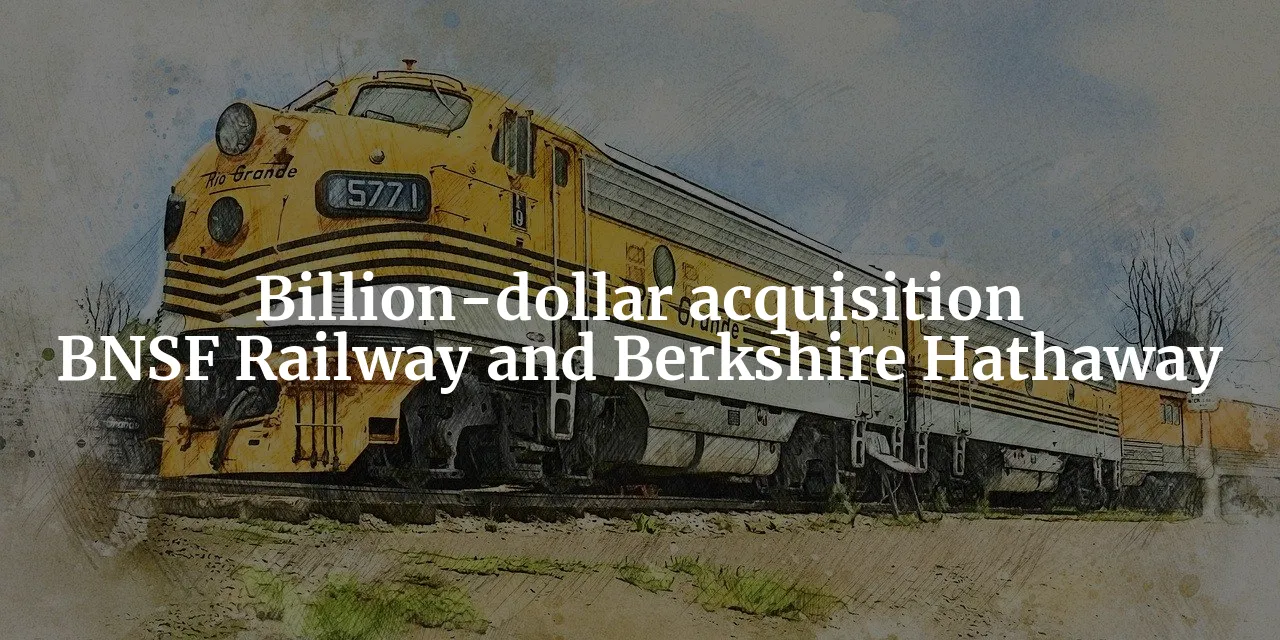Tags: BNSF / earnings / history
This fanpage is not officially affiliated with Berkshire Hathaway: Disclaimer
Berkshire Hathaway's acquisition of Burlington Northern Santa Fe Corporation (BNSF) in 2010 was the largest acquisition in Berkshire's history, signaling its confidence in the long-term prospects of the railroad industry. BNSF's Q1 2023 financials revealed decreased operating income and increased operating expenses. Despite these challenges, BNSF's long-term prospects remain positive, with increasing demand for efficient and environmentally friendly transportation solutions. Shareholders of Berkshire Hathaway should remain informed about BNSF's performance and industry trends to make informed investment decisions.

Introduction
In 2010, Berkshire Hathaway, led by Warren Buffett, acquired Burlington Northern Santa Fe Corporation (BNSF) for a staggering $26 billion, making it the largest acquisition in Berkshire's history. This acquisition was met with approval from BNSF shareholders during a special meeting, and as a result, Burlington shares ceased to be publicly traded and became a subsidiary of Berkshire. BNSF shareholders were given the option to receive payment for their shares in cash, Berkshire stock, or a combination of the two, with 40.85% choosing cash, 43.36% choosing stock, and 15.79% making no election1. Fast forward to the present day, and BNSF has released its Q1 2023 financials, which show a decrease in operating income and an increase in operating expenses. This article will provide a comprehensive review of Berkshire's acquisition of BNSF and BNSF's Q1 2023 financials for shareholders.
A Brief History of BNSF
BNSF was formed in 1995 through the merger of Burlington Northern Inc. and Santa Fe Pacific Corporation2. The newly formed company continued projects started by its predecessors, such as rehabilitating Stampede Pass and adding tracks to the ex-ATSF main line2. In 1999, BNSF and Canadian National Railway announced plans to combine as subsidiaries of a new holding company, North American Railways, but the merger was called off in 2000 due to opposition and a moratorium imposed by the Surface Transportation Board2.
Berkshire Hathaway's acquisition of BNSF in 2010 was a significant milestone in the company's history. The total value of the deal, including previous investment and assumption of debt, was $44 billion2. This acquisition signaled Berkshire's confidence in the long-term prospects of the railroad industry and BNSF's ability to generate consistent cash flow.
Berkshire's Acquisition of BNSF
Motivation Warren Buffett, has long been a proponent of the railroad industry, seeing it as a vital component of the American economy. The acquisition of BNSF Railway was a strategic move for Berkshire Hathaway, as it allowed the company to diversify its portfolio and gain exposure to a critical sector in the transportation industry.
The potential benefits of the acquisition for Berkshire Hathaway were numerous. BNSF Railway's extensive rail network and strong market position offered a stable and predictable cash flow, which was particularly attractive to Berkshire Hathaway's long-term investment strategy. Additionally, the acquisition provided Berkshire Hathaway with a unique opportunity to capitalize on the growing demand for more efficient and environmentally friendly transportation options, as rail transport is considered one of the most fuel-efficient and sustainable modes of freight transportation.
Actual Acquisition The acquisition of BNSF by Berkshire Hathaway was a monumental event in the history of both companies. BNSF shareholders who chose cash or did not make an election received $100/share cash, while those who chose stock received 92.25% of their $100/share in Berkshire stock and the remainder in cash1. In total, Berkshire paid about $15.87 billion in cash and issued approximately 80,932 shares of Class A stock and 21 million shares of Class B1. As a result of the acquisition, Berkshire's Class B shares replaced Burlington Northern in the S&P 500 stock index after the acquisition's closing bell at 4p ET on a specific date in 20101.
This acquisition demonstrated Berkshire Hathaway's belief in the long-term potential of the railroad industry and BNSF's ability to generate consistent cash flow ↗. It also signified a strategic move by Berkshire to diversify its holdings and invest in a company with a strong competitive advantage and a history of stable performance.
The acquisition has also had a positive impact on Berkshire Hathaway's financials and stock performance. Since the acquisition, Berkshire Hathaway's stock price has experienced significant growth, and the company's earnings have been bolstered by the steady cash flow generated by BNSF Railway. The addition of Berkshire Hathaway's Class B shares to the S&P 500 stock index, replacing Burlington Northern, further solidified the company's position as a major player in the market1.
BNSF's Q1 2023 Financials
BNSF's Q1 2023 financials revealed a decrease in operating income by 9% compared to Q1 2022, amounting to $1.9 billion3. The operating ratio for Q1 2023 increased by 3.8% compared to Q1 2022, reaching 68.4%3. Total revenues for Q1 2023 increased by 1% compared to Q1 20223. However, there were decreases in volumes across all product categories, with Consumer Products volumes decreasing by 16%, Agricultural Products volumes decreasing by 2%, Industrial Products volumes decreasing by 4%, and Coal volumes decreasing by 4%3.
Operating expenses for Q1 2023 increased by 6% compared to Q1 20223. Fuel expense increased by 12%, compensation and benefits expense increased by 7%, and materials and other expense increased by 22%3. On the other hand, purchase services expense decreased by 6%3. These financials indicate that BNSF faced challenges in maintaining its profitability during Q1 2023, with increased expenses and decreased volumes across all product categories. Despite these challenges, BNSF managed to increase its total revenues by 1% during Q1 2023 compared to Q1 20223, demonstrating the company's resilience in the face of adversity.
Future Outlook for BNSF
BNSF's future outlook remains promising, despite the challenges faced during Q1 2023. The company has a strong competitive advantage in the railroad industry and a history of stable performance. Additionally, the long-term prospects of the railroad industry remain positive, with increasing demand for efficient and environmentally friendly transportation solutions. BNSF is well-positioned to capitalize on these opportunities and continue generating consistent cash flow for Berkshire Hathaway shareholders.
However, BNSF may face potential challenges in the future, such as increased competition, regulatory changes, and fluctuations in commodity prices. It will be crucial for the company to continue investing in infrastructure, technology, and innovation to maintain its competitive advantage and adapt to the evolving transportation landscape.
Conclusion for Shareholders of Berkshire Hathaway
In conclusion, Berkshire Hathaway's acquisition of BNSF in 2010 was a strategic move that diversified the company's holdings and invested in a business with a strong competitive advantage and stable performance. BNSF's Q1 2023 financials indicate that the company faced challenges during this period, with decreased volumes across all product categories and increased expenses. However, BNSF's resilience and the long-term prospects of the railroad industry suggest that the company remains well-positioned for future growth and success.
As shareholders of Berkshire Hathaway, it is essential to remain informed about BNSF's performance and the factors that may impact its profitability. By staying up-to-date on the company's financials and industry trends, shareholders can make informed decisions about their investments and have confidence in the long-term potential of BNSF and Berkshire Hathaway as a whole.
References












